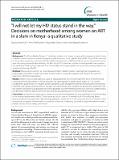| dc.contributor.author | Ujiji, Opondo Awiti | |
| dc.contributor.author | Ekström, Anna Mia | |
| dc.contributor.author | Ilako, Festus | |
| dc.contributor.author | Indalo, Dorcas | |
| dc.contributor.author | Rubenson, Birgitta | |
| dc.date.accessioned | 2021-09-01T13:00:44Z | |
| dc.date.available | 2021-09-01T13:00:44Z | |
| dc.date.issued | 4/28/2010 | |
| dc.identifier.citation | Awiti Ujiji, O., Ekström, A.M., Ilako, F. et al. "I will not let my HIV status stand in the way." Decisions on motherhood among women on ART in a slum in Kenya- a qualitative study. BMC Women's Health 10, 13 (2010). https://doi.org/10.1186/1472-6874-10-13 | en_US |
| dc.identifier.other | https://doi.org/10.1186/1472-6874-10-13 | |
| dc.identifier.other | PMID: 20423528 | |
| dc.identifier.uri | http://repository.amref.org/handle/123456789/204 | |
| dc.description | © 2010 Awiti Ujiji et al; licensee BioMed Central Ltd. This is an Open Access article distributed under the terms of the Creative Commons
Attribution License (http://creativecommons.org/licenses/by/2.0), which permits unrestricted use, distribution, and reproduction in
any medium, provided the original work is properly cited. | en_US |
| dc.description.abstract | Background
The African Medical Research Foundation antiretroviral therapy program at the community health centre in Kibera counsels women to wait with pregnancy until they reach the acceptable level of 350 cells/ml CD4 count and to discuss their pregnancy intentions with their health care providers. A 2007 internal assessment showed that women were becoming pregnant before attaining the 350 cells/ml CD4 count and without consulting health care providers. This qualitative study explored experiences of intentionally becoming pregnant among women receiving highly active antiretroviral therapy (HAART).
Methods
Nine pregnant women, six newly delivered mothers and five women wanting to get pregnant were purposefully selected for in-depth interviews. Content analysis was used to organize and interpret the women's experiences of becoming pregnant.
Results
Women's choices for pregnancy could be categorized into one overarching theme 'strive for motherhood' consisting of three sub-themes. A child is thought of as a prerequisite for a fulfilled and happy life. The women accepted that good health was required to bear a pregnancy and thought that feeling well, taking their antiretroviral treatment and eating nutritious food was enough. Consulting health care providers was perceived as interfering with the women's decisions to get pregnant. Becoming pregnant as an HIV-infected woman was, however, complicated by the dilemmas related to disclosing HIV infection and discussing pregnancy intentions with their partners.
Conclusions
Motherhood is important to women on antiretroviral treatment. But they seemed to lack understanding of the relationship between a high CD4 cell count and a low chance of transmission of HIV to offspring. Better education about the relationship of perceived good physical health, low CD4 cell count and the risk of mother to child transmission is required. Women want to control the domain of childbearing but need enough information to make healthy choices without risking transmission. | en_US |
| dc.description.sponsorship | SAREC, the research division of Sida, the Swedish International Development Cooperation Agency | en_US |
| dc.language.iso | en | en_US |
| dc.publisher | BioMed Central | en_US |
| dc.subject | Antiretroviral therapy (ART) | en_US |
| dc.subject | Community health centre | en_US |
| dc.subject | Kibera | en_US |
| dc.subject | CD4 count | en_US |
| dc.subject | Highly active antiretroviral therapy (HAART) | en_US |
| dc.subject | Pregnancy | en_US |
| dc.subject | Prevention of mother-to-child transmission of HIV (PMTCT) | en_US |
| dc.subject | Sexually transmitted infections (STIs) | en_US |
| dc.title | “I will not let my HIV status stand in the way." Decisions on motherhood among women on ART in a slum in Kenya a qualitative study | en_US |
| dc.type | Article, Journal | en_US |

